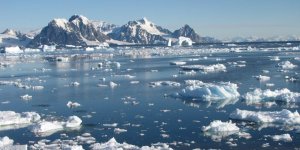World

Palaeontologists unearthed a two meters long thigh bone that belonged to a giant sauropod dinosaur around 140 million years ago. »

There are two primary causes of global mean sea level rise - added water from melting ice sheets and glaciers, and the expansion of sea water as it warms. »

A high-tech company called Merlin Burrows believes it might have finally pinpointed the remains of the mythical city of Atlantis where it once stood. »

Egyptian archaeologists have discovered a rare collection of mummified scarab beetles, as well as an apparently pristine Fifth Dynasty tomb they plan to open in the coming weeks in the Saqqara necropolis, 30 km (19mi) south of Cairo. »

The world's largest colony of king penguins has declined by nearly 90 percent in 35 years, according to an alarming study. »

The Sahara Desert has expanded by about 10 percent since 1920, according to a new study by National Science Foundation (NSF)-funded scientists at the University of Maryland (UMD). »

Australian authorities urged people to remain alert on Monday as wildfires that have destroyed dozens of homes, killed cattle and forced hundreds of residents to flee continued to burn out of control in the southeast of the country. »

After three consecutive years of record-high temperatures for the globe, Earth was a slightly cooler planet in 2017. But not by much. »

The World Meteorological Organization reports 2017 is on track to be among the three hottest years on record, just behind the two preceding years. »

Egypt authorities announced Saturday that archaeologists had discovered two small ancient tombs in Luxor, a southern city. »

Measurements from NASA satellites showed the hole in the Earth’s ozone layer that forms over Antarctica each September grew to only 7.6 million square miles in extent (coverage) before starting to recover this year. The average peak area observed since 1991 has been roughly 10 million square miles. »

Aboriginal rangers have discovered new evidence of one of Australia’s rarest and most mysterious birds. »

Oceanographic ship Ary Rongel set off Wednesday (Oct. 11) from Rio de Janeiro with 107 crew members to provide support for Brazil’s scientific research projects in Antarctica. The vessel is expected to reach the continent on October 26. »

Egypt announced the discovery of a pharaonic tomb in the southern city of Luxor belonging to a royal goldsmith who lived more than 3,500 years ago during the reign of the 18th dynasty. »

The Airspace Operations Command in Brasília has kicked off operations of the Geostationary Satellite for Defense and Strategic Communications (SGDC). »

Brazilian cities in coastal areas are more vulnerable to climate change, especially to the sea level rise, but also to such events as heavy rain, storms, floods, and coastal erosion, all of which cause destruction and adversely affect infrastructure in these municipalities. »

The deforestation of the Atlantic Forest, Brazil's second most important forest, grew 57.7% in a year, from 2015 to 2016, when the biome lost 29,075 hectares, or 29 thousand football fields. »

Illegal occupation of land, deforestation, and monitoring efforts were some of the problems detected during the three years of research by the Joaquim Nabuco Foundation in 14 of the country's Federal Conservation Units of Total Protection, located in the caatinga—a biome often referred to as the Brazilian savanna. »

Ice cores drilled from a glacier in a cave in Transylvania offer new evidence of how Europe's winter weather and climate patterns fluctuated during the last 10,000 years, known as the Holocene period. »

A network of sensors with microphones and cameras will be created under the Amazon rainforest canopy to collect data on how animals there behave, on an ongoing basis. »

Remains of microorganisms at least 3,770 million years old have been discovered, providing direct evidence of one of the oldest life forms on Earth. »

Researchers say there is a submerged continent in the southwest Pacific Ocean, that should be considered an eighth continent. They’re calling it Zealandia in a nod to the largest part of the continent that is above water, New Zealand. »

The Brazilian Health Surveillance Agency granted the registration for the first cannabis-based (marijuana) medicine in Brazil. Dubbed Mevatyl, the product is prescribed for the treatment of adults who suffer from spasms triggered by multiple sclerosis. »

When paleontologists cut into the fossilized jaw of an ancient creature, they got more than they bargained for: a toothy tumor. »

An international team of researchers announced on Thursday they have found the tail of a juvenile dinosaur preserved in amber — with its feathers still attached. »

Researchers have discovered a perfectly preserved dinosaur tail in a piece of amber in Myanmar. »

A historic deal has been reached to create the world's largest marine reserve in Antarctica, after years of diplomatic wrangling. »

Brazil is going to support the creation of a whale sanctuary in the South Atlantic to protect cetaceans from hunting and ensure their survival. Environment Minister Sarney Filho will uphold that when the International Whaling Commission votes on the issue on 24 October in Slovenia. »

Learn math playing. That's the idea of Matemagos, a game designed for smartphones that combines magic with the subject considered the horror of students. »
